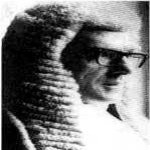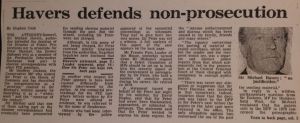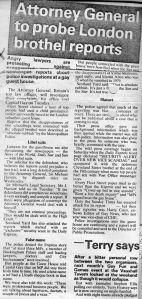Sir Michael Havers, brother of Baroness Butler-Sloss
Sir Michael Havers was appointed as Attorney General by Margaret Thatcher in 1979, and was made Baron Havers in 1987. He intervened three times between 1981 and 1983 to stop the investigation and exposure of Establishment paedophiles, and to prevent the publication of stories which showed that Establishment figures were members of the Paedophile Information Exchange.
Although none of this implicates Havers’ sister, Baroness Butler-Sloss,in any way, it seems at the very least deeply inappropriate to have someone heading a ‘historic’ child abuse inquiry whose own brother played such a major role in the protection of Establishment paedophiles throughout the 1980s.
1981: Sir Peter Hayman
In 1981, Sir Michael Havers warned Geoffrey Dickens not to name senior diplomat Sir Peter Hayman as a paedophile in the House of Commons. Dickens ignored his advice, and was publicly condemned by Havers, who said “All Mr Dickens has done is make certain that Sir Peter’s shame and embarassment is known to the world. There cannot be any justification whatsoever for what has happened. How can the public have gained by this? How can it be in the public interest to name this man?“.
Sir Michael Havers defended the decision not to prosecute Hayman despite possessing a huge collection of images of child abuse including – as Barry Dickens revealed earlier this week – babies being abused in their prams. Dickens accued Sir Michael of taking part in a “whitewash and “the cover-up of the century”.
1982: Elm Guest House
The Elm Guest House scandal involved powerful Establishment figures sexually abusing young boys at a guest house in Barnes. The story hit the headlines in August 1982 and ran for just 10 days, but then the coverage stopped suddenly and it wouldn’t be mentioned again in a British newspaper for many years. The reason for this news blackout seems to have been threats of legal action. Sir Michael Havers “personally investigated” complaints against newspapers from lawyers representing Elm Guest House.
1983: Geoffrey Prime
Geoffrey Prime was a former Cheltenham GCHQ worker who was also spying for the Russians, and ended up being jailed for 38 years. He had also been charged with sex offences against two young girls, and during the raid on his home police discovered Paedophile Information Exchange literature that would only have been available to members of the organisation. The Sun reported this, and said that Sir Michael Havers had held back from mentioning Prime’s PIE membership during his trial “to avoid embarassing security chiefs”. Sir Michael complained to the Press Council, but The Sun stood by their story and refused to reveal their source. Geoffrey Dickens had raised The Sun’s allegation in Parliament and forced Mrs Thatcher to make a strong denial.
Sir Peter Hayman named as PIE member in the House of Commons
Elm Guest House: The History of a Cover-Up
Geoffrey Prime, GCHQ, and the Paedophile Information Exchange




Reblogged this on Britain Isn't Eating and commented:
And the cover up’s never end!
Spotlight has lit up another interesting (and predictable) fact that the Govn will do anything to bury this “Establishment Paedophilia”
“All in this together” as they like to say. Yes.
The Judge appointed to head up this inquiry into the sexual abuse of children by well known Establishment figures is Baroness Butler-Sloss, the sister of Sir Michael Havers who was appointed Attorney General by Margaret Thatcher in 1979!
Full story here…
Reblogged this on Thinking Out Loud and commented:
It can’t be said too often how important it is to keep a close watch on the review and investigations into child sexual abuse.
Reblogged this on Bob in Vienne and commented:
I suspect that Sir Michael Havers got things very wrong in these matters – at the very least.
Let us all hope that his sister will put the record straight. She should not be in this position though.
This is not very confidence building.
that’s putting it mildly Bob in Vienne
Pingback: Head of paedophile inquiry’s own brother accused of protecting VIP paedophiles | Pride's Purge
http://books.google.com/books?id=gvQeAQAAMAAJ&q=%22influenced+by+his+sister,+Mrs+Justice+Butler-Sloss,+a+family+judge+in+the+high+court+who%22&dq=%22influenced+by+his+sister,+Mrs+Justice+Butler-Sloss,+a+family+judge+in+the+high+court+who%22&hl=en&sa=X&ei=4zi9U92qKtKzyASIyYKADw&ved=0CB4Q6AEwAA
New Society, Volumes 81-82
New Society Limited, 1987
[Page 94]
Justice for families – 7 August 1987
The case for a family court is gaining momentum. But it alone will not solve the legal problems created as more and more relationships break up, reports Kirsty Milne.
…………………………………………………………….
Dickens knew that the wheels of the law grind exceeding slow, but nowhere is this more painfully apparent than in the long-running family courts saga. The idea of a family court has been on the legal agenda for more than a decade, making a snail’s progress ****since Lord Havers took his seat on the Woolsack there has been a new spring in the step of the weary proponents of reform.****
The issue at stake is a simple one. Up to two million men, women and children have dealings with the courts every year on family- related issues: divorce, custody, maintenance, access or care. For many people this will be their only point of contact with the British legal system in a lifetime. Yet the machinery they face is nothing short of chaotic, described feelingly by Michael Baker of the Family Courts Campaign as “an administrative nightmare.” Historically, justice evolved as a class-based service. If you had money and you wanted to remarry you went to the high court; if you were working class and were being beaten up by your husband you went to the magistrates court. The result is that no one court has exclusive jurisdiction over family affairs. Matrimonial disputes can be transferred at different stages between magistrates’ domestic courts, divorce county courts and the high court. And custody cases can be pursued in any of four different courts of law.
The degree of overlap makes it perfectly possible for proceedings which involve the same child or the same relationship to be going on in several courts at once, in different buildings, with different procedures and personnel. “It’s so confusing for people,” says Lady Faithfull, president of the Family Courts Campaign.
Recent events in Cleveland offer a painful illustration of how complicated things can get. The local authority took children into care by seeking a place of safety order in the magistrates court. When the children’s parents appealed against the care order, the local authority was able to reopen the case in the high court by making the children wards of court – only the high court can deal with wardship cases.
Such procedural anomalies obviously need sorting out. A unified family court would rationalise the existing confusion and make it easier for people to settle the related issues which arise when a marriage breaks up. It would provide an opportunity forjudges, barristers and solicitors to specialise in family law, working with the court’s own welfare service. Conciliation would be available for couples who were prepared to try and arrange settlements before they came to court.
Such a system operates successfully in New Zealand, where a family court has existed since 1981. It deals with all interrelated family issues in an informal atmosphere, with ready access to conciliation and counseling.
Events in Britain have characteristically taken a more ponderous course. The Finer Committee on one-parent families recommended the establishment of a unified and independent family court in 1974. But the government demurred. Barbara Castle, then secretary of state for health and social security, recorded in her diaries being briefed by the then Lord Chancellor: “Elwyn was charming as usual and convinced me that the elaborate new machinery Finer proposes is just not on”.
But since Finer there has been a growing — if thwarted — consensus; more than 100 organisations have come out in favour of reform, including the Law Society, the nspcc and the British Association of Social Workers. The Family Courts Campaign, formed in November 1985, metamorphosed from an ad hoc umbrella organisation into a permanent pressure group.
****What has put fresh hope into campaigning now is the arrival of a new Chancellor, Lord Havers***. In his first speech from the Woolsack on 21 July he indicated his support for the principle of a family court. ****He had rather endearingly confessed that his views have been influenced by his sister, Mrs Justice Butler-Sloss, a family judge in the high court who is also chairing the Cleveland inquiry.****
One straightforward problem is money. The Treasury, say campaigners somewhat grimly, will have to be persuaded. Lord McGregor, an Alliance peer who sat on the Finer Committee and has been a supporter of family courts ever since, points out that the Lord Chancellor’s department is traditionally a low spender, and requests for a special expenditure programme would hardly be welcome to the government.
But the debate about money is not so straightforward. Those advocating family courts argue that reform need not be as expensive as the government assumes. Research by Judge Jean Graham Hall suggests that a streamlined family court could bring about savings in court time, administration and legal aid bills.
Nevertheless, Lord Havers did say unequivocally in the Lords’ debate last month that an independent and unified family court with its own accommodation, staff and judiciary “is not one which my government would consider affordable.” Fear of extra expenditure may incline the government to some administrative tinkering, such as eliminating overlap between courts or designating part of the existing county and high court structure.
This, however, would raise the problem of magistrates. Most family court proposals envisage removing domestic jurisdiction from magistrates courts, although some foresee a role for magistrates on family court benches.
It seems to be generally agreed that there is an unsatisfactory overlap between the magistrates’ domestic and criminal jurisdiction. Research carried out for the Lord Chancellor’s department at Bristol university suggests that people who come to court with family problems are upset by the criminal associations of the magistrates bench. Women who are suffering from violence at home, for example, may find it deeply distressing to be in the same waiting room as someone charged with a criminal offence.
Any attempt to take business away from the magistrates courts, however, is likely to be resisted by the home office. Lord McGregor has experience of this: “The home office treats magistrates like a personal fiefdom, and has fought tooth and nail since the late 1960s against any reduction in their powers.”
Even so, the most likely outcome of the long campaign for family courts will probably be a special division of the existing high court county court structure. But arguments about adminstrative form can obscure the transforming pressure which social change has brought to bear upon the law. With one in three marriages ending in divorce…
*****************************
In a Guardian article, Butler-Sloss replied to the fact of her brother Sir Michael Havers intervening three times to prevent exposure of Establishment Paedophiles thus: “I know absolutely nothing about it,” she told the BBC. How could she not know? http://www.theguardian.com/society/2014/jul/09/butler-sloss-inquiry-role-asked-to-step-down
Regardless of her qualities and experience, this lady is at the heart of the Establishment. She will be investigating people she knows, people she has worked with, and socialised with. The law may well be reason without emotion but we need someone with a sense of empathy for the wreckage of lives that has resulted from Establishment paedophiles raping and assaulting children.
Children are treated badly enough in this country, alternately sentimentalised and demonised, child poverty rising rapidly through successive governments, despite weasel words. To bring to justice a collection of repulsive Savile Row suited perverts would be a start in redressing the balance.
SPOTLIGHT on abuse is perhaps the best source for information on the net at the moment,we repost where we can
Pingback: Sir Michael Havers, brother of Baroness Butler-Sloss | L8in
Pingback: Angleterre : Où l'on parle de politiciens assassins d'enfants